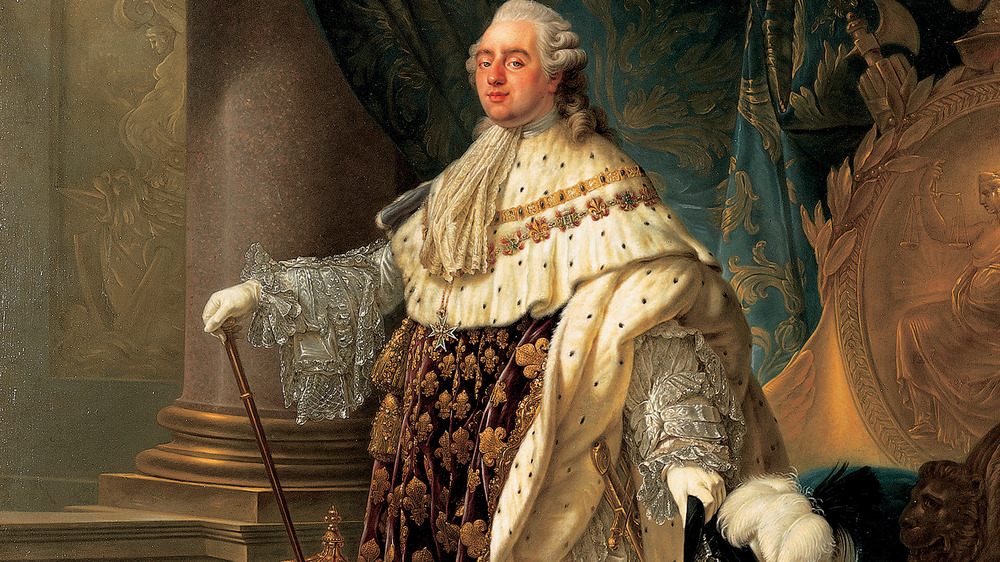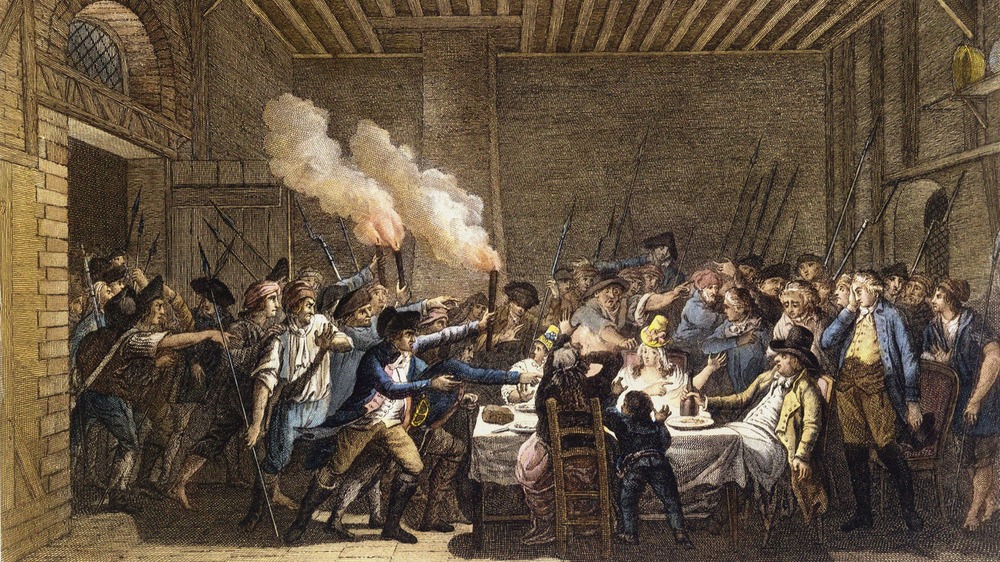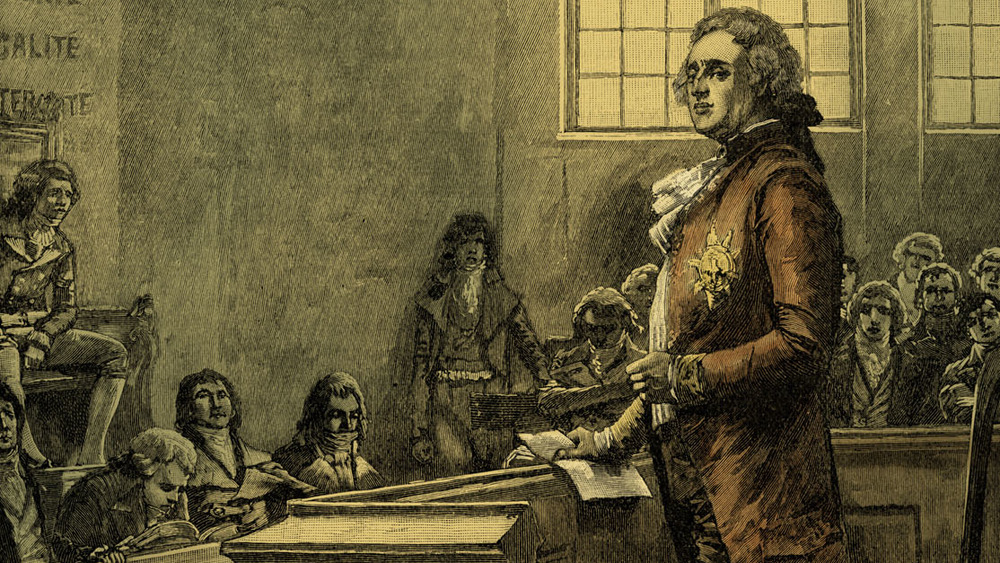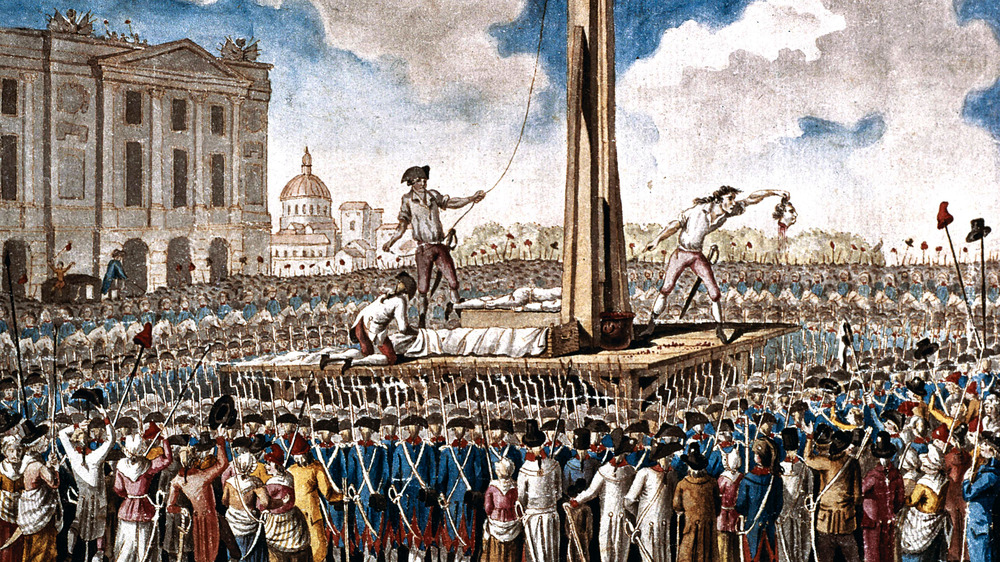This Is How Louis XVI Was Condemned To Death
When it comes to regicide — the killing of a king — the historical record is blood-soaked indeed, but few are quite as famous as the execution of France's King Louis XVI, as well as his wife, Marie Antoinette. Louis inherited the throne in 1774 when he was still way too young for any reasonable person to hand him ultimate power — not quite 20 years old. Louis XVI was an immature king, according to Britannica. He had no confidence and little experience, both things he could've used with the ruling court fractured during a time when people were calling for government reform.
Louis XVI was hit and miss when it came to political reforms. The king's early rule had its successes. He reintroduced powers to parliament that his grandfather had previously stripped, and he won some international favor when he assisted the American colonies during their Revolutionary War, but that assistance caused significant financial strain for France. The country was nearly bankrupt. Something had to be done, and that something was radical economic and administrative reform. As you can imagine, the king was having a stressful time with it all, and it was made all the more difficult when he missed the assembly set to approve these necessary reforms, an act that lit the spark for France's political revolution.
Louis XVI's reaction to the revolution is what got him in trouble
When Louis XVI called the States-General, that critical meeting he missed, things got real. The assembly, which History says hadn't been gathered since 1614, brought together the clergy, the noble elite, and the common folk. The commoners weren't too happy with the way Louis XVI had been running the country, and, according to Britannica, they used the assembly as a chance to push for a constitutional monarchy, a system of government similar to what was going on in England at the time, whereby the monarchy shared its power with a parliamentary branch of government that balanced things out.
This is when the last king of France got flip-floppy and really messed things up for himself. His public face accepted the revolution and seemed to be willing to share his power, but behind closed doors, Louis refused to listen to the advice from the revolutionaries and allowed his wife to do all the shady things that would lead her to literally lose her head a few years later.
Ohio State University points out that by 1791, the revolution had gained enough traction that the royal couple tried to flee to Austria (his wife's native country) in an attempt to hide out and slap together a resistance movement. Instead, they were captured and returned home, where they were forced into the new government under a constitution that took away any real power the monarchs previously possessed.
Condemned to death by a single vote
When Louis tried to flee France with his family, the citizenry viewed it as a slight. The people had been abandoned, and they weren't happy about it. Louis reinforced the insult with the letter he left behind upon his departure. The letter, according to Ohio State University, was a reversal of his support for the revolution. He claimed he'd never actually supported it in the first place and only pretended to do so under duress.
Within a year of Louis's forced return, he found himself imprisoned and charged with treason. Evidence of the king's counter-revolutionary activities was brought forth to the Legislative Assembly, claiming that Louis had been bribing officials and forcing his men to lie to the Assembly along with other acts obstructing the revolution. The king was in serious trouble.
Upon a vote, the Assembly found the King of France guilty by an overwhelming margin, but his fate wasn't sealed quite yet. There was still the question of his sentencing, which, according to the Roy Rosenzweig Center for History and New Media, didn't do much to save the guy. Louis XVI was doomed to death by a single vote. Lumen Learning points out that his own cousin, who voted for Louis's death, could've saved the king had he voted in the other direction, but blood wasn't thicker than the people of France.
They tried to erase Louis from history
Louis XVI's execution was notable for a couple of reasons. It symbolized the end of the French monarchy (for the time being, anyway), and Louis died in exemplary fashion. With 20,000 people gathered in attendance, Louis was led to the Place de la Révolution, where a guillotine was waiting to end his life. According to Ohio State University, Louis remained quite composed as he faced the instrument of his death. He willingly took off his jacket and his collar, and he addressed the crowd with a dignified final speech: "I die innocent. I pardon my enemies and I hope that my blood will be useful to the French," Louis stated.
When the blade fell, Louis's life was ended, but the French weren't satisfied. They went about erasing all evidence of the former king's existence. All records of the king, minus his execution, seemed to evaporate. His execution anniversary wasn't celebrated. The memory of his reign was only kept alive outside of the country by the Church and in foreign records. It wouldn't be until the 19th century that Louis would be recognized again by France, following his younger brother assuming a position of power. But by then, the absolute reign of monarchs was history.



